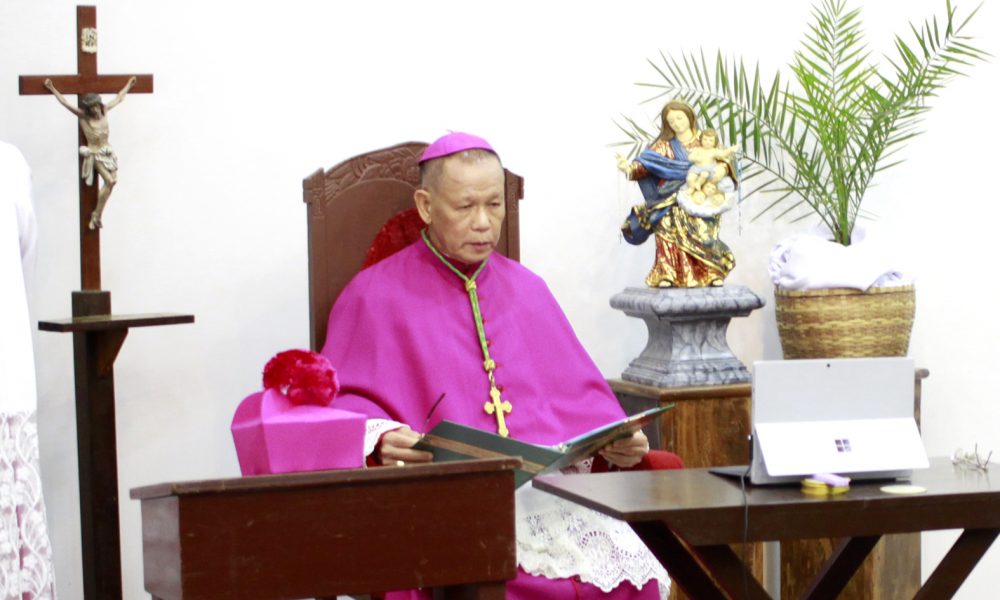
By Msgr. Regie Pamposa
After his ordination to the priesthood on April 4, 1976 having completed his theological studies at the University of Sto. Tomas in Manila and priestly formation at the Central Seminary of the same university, Father Joe, the young priest, returned to his alma mater as professor and spiritual director.
There, Father Joe manifested his charism in dealing with high school and college seminarians aged 12 to 20. He was not just considered by most seminarians as a Latin teacher or Philosophy professor in Logic but, most of all, as a spiritual director who joyfully found time in listening to their worries and cries (literally) of homesickness, of being away from their parents and families.
The young Father Joe was a priest whom the seminarians could easily relate to, someone who would joke with them like a friend inside and outside the classroom, but who would also offer constant words of encouragement.
Father Joe, feeling a sense of inadequacy of being a spiritual director at a young age, pursued a degree in Master of Arts in Education, major in Guidance and Counselling at De La Salle University in Manila that further helped him become a better priest-counselor and spiritual director to many seminarians.
Through the years, the Pians, the name given to seminarians of St. Pius Seminary, have found a friend, a mentor, and an older brother, as Father Joe would sometimes call some of them not just by their first names but even by their parents’ names. This has made Father Joe truly endearing to many PIANs beyond the walls of the seminary.
One enduring characteristic of the cardinal-elect is his pursuit for what is best. It seems Cardinal Joe cannot afford to be lackadaisical in his pastoral ministry either as a simple priest or a less-known bishop.
His ministry at St. Pius X Seminary, however, was cut short after he was asked by the late Archbishop Frondosa, his townmate, to study in Rome in 1984. God must have other plans for him.
While residing at Pontificio Collegio Filippino in Rome, he enrolled at the Pontificia Universita di San Tomaso, known as the Angelicum, for a degree in Canon Law, the same university where St. John Paul II also studied.
Returning to the country in 1990, the then Father Joe was given an assignment so far away from Capiz. He was appointed canon law professor, spiritual director, and dean of studies of the Immaculate Conception School of Theology, the regional seminary of northern Luzon, in Vigan, Ilocos Sur. He was definitely back to his original love!
For the meantime, Capiz had to wait for his much-anticipated comeback. Though miles away from Capiz, he reckoned the thought of serving once again his home diocese.
After serving the Archdiocese of Vigan for three years, everyone thought that Father Joe would finally come back to Capiz. But God sent him to another place though closer to Capiz. He was appointed professor and spiritual director of St. Joseph Regional Seminary of the Archdiocese of Jaro in Iloilo from 1993 to 1995.
But being away from home was an opportunity for Father Joe to be acquainted with other priests from the whole Panay Island, Region 6, Negros, and the northern parts of the Philippines.
He must have covered and travelled the entire archipelago! Until today, Cardinal-elect Joe can carry a conversation in Ilocano and Cebuano. He amazingly possesses the gift of language and is blessed with a sharp memory. One may bet that, at 68, he can still recall the intricate Latin conjugations or even win a scrabble match.
AUDIAM
His episcopal motto, “Audiam” (I will listen), explains everything that Archbishop Joe does, a bishop who loves to listen, truly a discerning leader in times of crises and trials. He never gets tired of listening to his priests, seminarians, religious, and lay people in their moments of difficulties.
Never quick to judge, he avoids being biased to any priest. He epitomizes an all-embracing kind of person shunning no one, giving each one a chance to be heard or listened to.
In most monthly meetings of priests that sometimes run for more than four hours, Archbishop Joe patiently listens without losing his thought and composure, except for a bathroom break, a result perhaps of drinking too much coffee around 6:00 am, that has become his daily routine, aside from an early jog or walk around the seminary grounds surrounded by lush and tall trees.
He gladly boasts that a one-hour jog energizes and prepares him for the daily grind.
For instance, he would even take a quick jog at the Luneta Park, whenever he was in Manila for meetings with the Catholic Bishops’ Conference of the Philippines as a former member of its permanent council and head or member of other episcopal committees.
PASSION FOR NATURE AND ENVIRONMENT
Monsignor Joe has always been a lover of nature and the environment. Up to this day, he can still identify and even name the numerous trees he once planted in the college seminary in Brgy. Cagay, Roxas City, with instructions to preserve them.
In his younger years as a priest, Monsignor Joe loved to trek mountains and hills. When in the States, for instance, he would first look for mountains or hiking trails or, at least, an open park where he could jog or walk. Seldom would he look for a shopping mall, except for a sporting store where he could buy his running shoes and shorts.
As the first rector of Sancta Maria Mater et Regina Seminarium in 1999, the major seminary of the Archdiocese of Capiz, Monsignor Joe would spend his weekends together with some seminarians and priests trekking the mountains of Tapaz that, unknown to many, brought the newly elected cardinal to be in contact with the Tapaz Bukidnons, the indigenous people of Capiz.
Because of those mountain hikes, his passion for years, the would-be cardinal literally saw the sad plight of poor people in far-flung areas; and thus, recognizing the need not only to evangelize but also to help them.
This is actually called the culture of encounter espoused by modern theologians as a means of bringing the gospel message to diverse people and culture.
Up to this day, Archbishop Joe still shares his dream of having indigenous songs being sung in the local Church of Capiz.*






